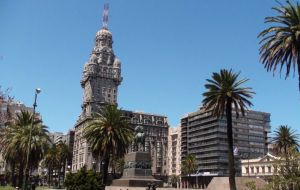MercoPress. South Atlantic News Agency
Uruguay ranks as the most peaceful country in Latinamerica
 Plaza Independencia, downtown Montevideo
Plaza Independencia, downtown Montevideo Figures published this week by the Global Peace Index, GPI, show homicide rates and violent crime had increased around the world, particularly in Latin America, where levels of peacefulness showed the biggest slip over the past 12 months. According to that criteria Uruguay (24) ranks as the most peaceful country of the region and Colombia (138) the most violent out of a world total of 149.
The GPI has been published annually for the last four years by the Institute for Economics and Peace, a global think-tank that researches the relationship between economics, business and peace. The rankings, compiled by the Economist Intelligence Unit, are calculated using 23 indicators, such as violent crime, political stability and military expenditure, correlated against a number of social development indicators such as corruption, freedom of the press, respect for human rights and school enrolment rates.
Since 2007 when the GPI begun to be elaborated, peace in Latinamerica has fallen back 3.02% and 3.87% in Central America. This year’s edition has New Zealand ranked as the most peaceful country followed by Iceland, Japan, Austria, Norway, Ireland, Denmark, Luxembourg, Finland and Sweden in the first ten places.
At the other extreme figure countries at war or in permanent conflict such as Iraq (149), Somalia, Afghanistan, Sudan, Pakistan, Israel, Russia, Georgia, Chad and Congo.
Western Europe is markedly the most peaceful region, with the majority of the countries in this group ranking in the top 20 overall. All five Scandinavian nations are ranked in the GPI’s top ten, with high levels of safety and security indicating broadly harmonious societies, free from civil conflict.
Scores in the Nordic nations’ military spheres tend to be relatively high, however. Only Iceland and the United Kingdom experienced improving scores from last year, with Iceland’s political scene returning to stability after the financial turmoil of late 2008.
Latin America’s average GPI score is slightly higher than that of the Asia-Pacific, suggesting it is a marginally less peaceful region.
Uruguay is ranked highest in 24th place, overtaking Chile and moving up one position from last year, although its score changed only slightly. Rises in some of Chile’s measures of militarization contributed to a worsening of its score, as did a rise in its homicide rate.
Costa Rica’s high ranking in the GPI (it rose 3 places in 2010 to 26th) partly reflects very low scores for almost all its measures of militarization, in step with the abolition of the country’s army at the end of the civil war in 1948.
Costa Rica’s relations with neighbouring countries are adjudged to have improved last year and violent crime was perceived to have fallen to a relatively low level (Cuba continues to receive the lowest score in Latin America for this indicator).
The Dominican Republic’s overall tally fell sharply, with growing political instability, a heightened likelihood of violent demonstrations and a worsening human rights situation.
Honduras’ score also dropped considerably and it fell eight places to 125th position. Several measures of the Central American nation’s societal safety and security registered increases amid rising tensions triggered by a military coup in June that ousted the president, Manuel Zelaya.
Colombia remains the lowest-ranked country in the region, with very high scores in the majority of its measures of safety and security and fairly high levels of militarization.
The regional ranking behind Uruguay (24) and Costa Rica (26) has Chile (28); Panama (61); Nicaragua (71); Cuba (72); Paraguay (78); Bolivia (81); Brazil (83); Peru (89); Jamaica (98); Ecuador (101); El Salvador (103); México (107); Guatemala (112); Haiti (114); Venezuela (122); Honduras (125) and Colombia (138).
Other interesting rankings are Spain (25); UK (31); China (80); United States (85) and South Africa hosting the World Cup, 121.




Top Comments
Disclaimer & comment rulesCommenting for this story is now closed.
If you have a Facebook account, become a fan and comment on our Facebook Page!